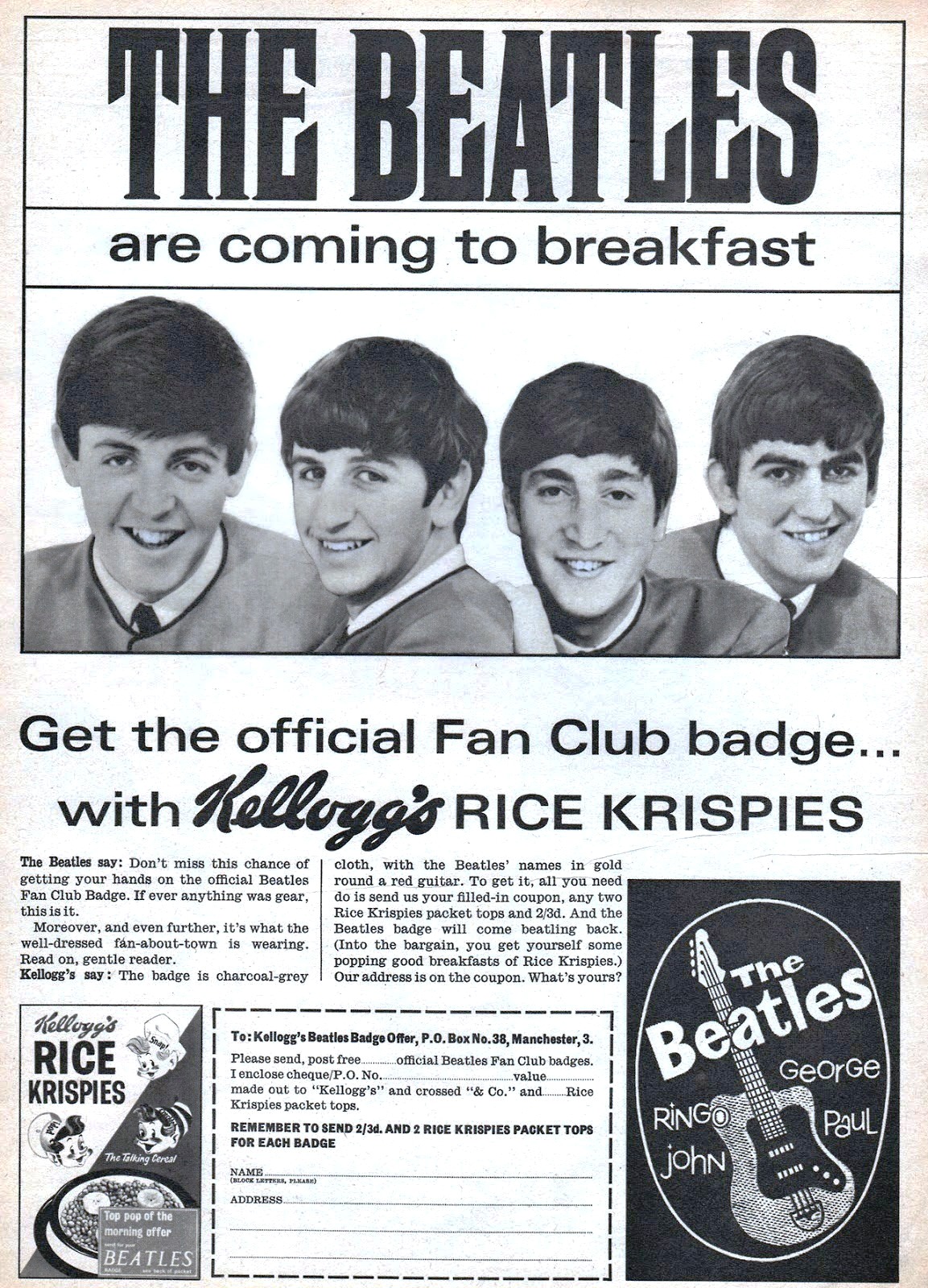Even Jerry Lee Lewis Was a Beatles Fan
The TV That Time Forgot: Maverick
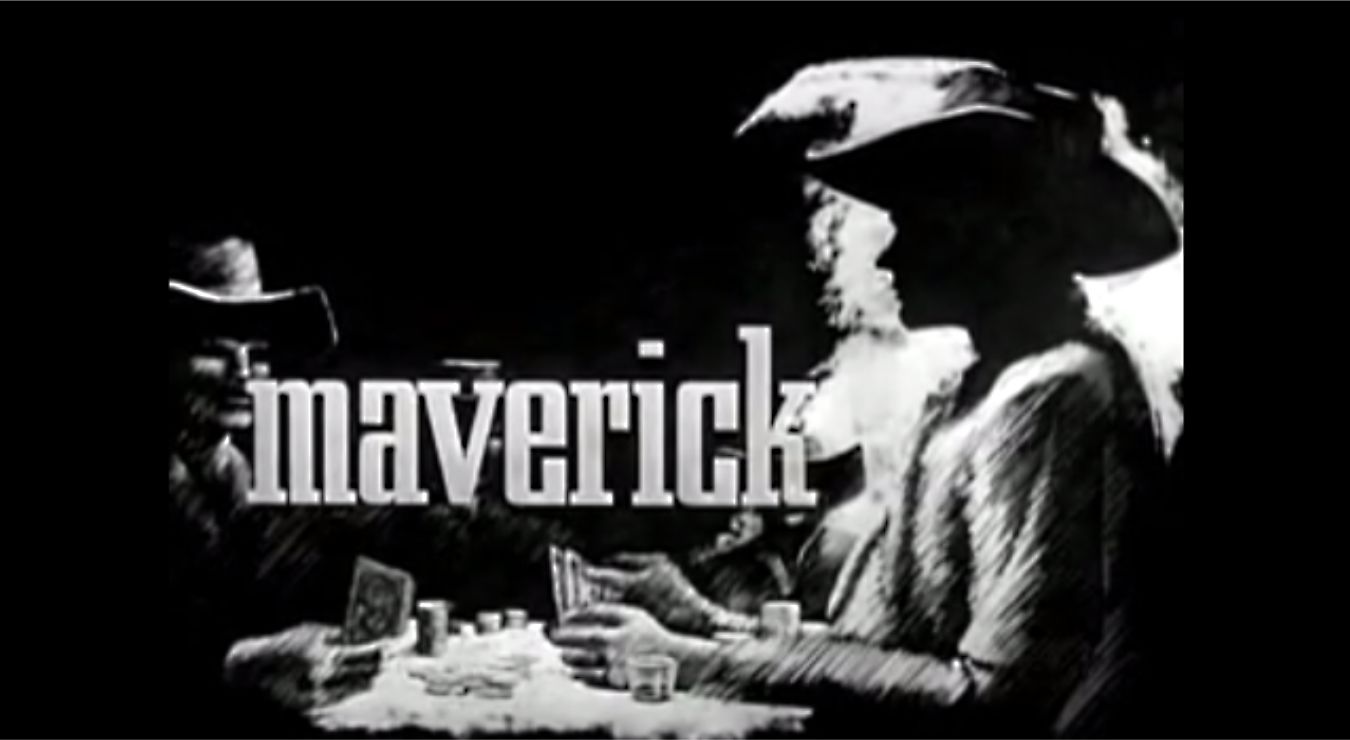 When you mention the TV series Maverick to any Baby Boomer, the first name they are likely to mention is James Garner. Yet, here’s a fun fact. Garner starred in less than half of the Maverick episodes filmed!
When you mention the TV series Maverick to any Baby Boomer, the first name they are likely to mention is James Garner. Yet, here’s a fun fact. Garner starred in less than half of the Maverick episodes filmed!
The Maverick TV series was very popular, running from the fall of 1957 through the summer of 1962 or 5 full seasons. But Garner left the show after Season 3 and even then, he shared the first 3 seasons with actor Jack Kelly, who played brother, Bart Maverick to Garner’s Brett.
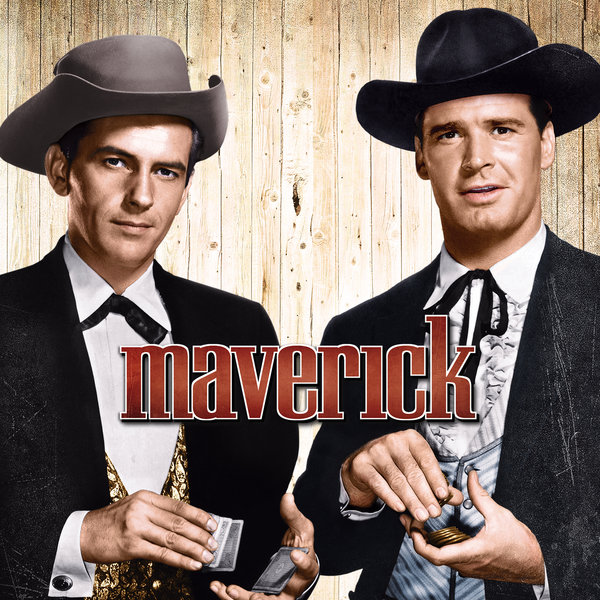 The show had been created for Garner by Roy Huggins. But it very quickly fell behind schedule. They just couldn’t finish an episode a week. So brother Bart was created. That way, two crews could be working separately – one with Garner and one with Kelly. It was a formula that worked so well, Warner Brothers adapted it to the mystery series they began cranking out (77 Sunset Strip, Hawaiian Eye, and others). Each show was given more than one leading man and multiple episodes could then be in production simultaneously.
The show had been created for Garner by Roy Huggins. But it very quickly fell behind schedule. They just couldn’t finish an episode a week. So brother Bart was created. That way, two crews could be working separately – one with Garner and one with Kelly. It was a formula that worked so well, Warner Brothers adapted it to the mystery series they began cranking out (77 Sunset Strip, Hawaiian Eye, and others). Each show was given more than one leading man and multiple episodes could then be in production simultaneously.
The series itself was a departure for prime-time Westerns of the time. For one, Maverick featured a lot more tongue-in-cheek humor. Second, the Maverick boys were not lawmen. They were professional gamblers who, if they didn’t really break the law, certainly bent it out of shape on any number of occasions. While the boys got into their share of fights, they frequently came out of those fights the losers; and they used their guns a whole lot less frequently than TV cowboy contemporaries.
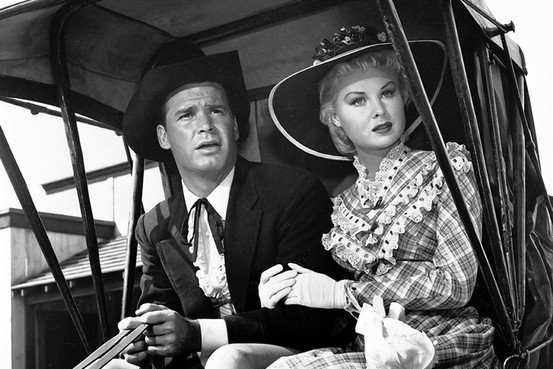 For whatever reason, audiences took a greater liking to Garner than Kelly. In fact, James Garner became one of the first actors who could move from TV to feature films and then back to TV with ease. He left Maverick after 3 seasons partially because he didn’t like his salary arrangements (a frequent theme in Garner’s career) and partially because he was being offered feature film work. He went on the star in two Doris Day comedies and even played Raymond Chandler’s famous detective Philip Marlowe in a movie based on Chandler’s novel The Little Sister (but titled Marlowe for the movies).
For whatever reason, audiences took a greater liking to Garner than Kelly. In fact, James Garner became one of the first actors who could move from TV to feature films and then back to TV with ease. He left Maverick after 3 seasons partially because he didn’t like his salary arrangements (a frequent theme in Garner’s career) and partially because he was being offered feature film work. He went on the star in two Doris Day comedies and even played Raymond Chandler’s famous detective Philip Marlowe in a movie based on Chandler’s novel The Little Sister (but titled Marlowe for the movies).
When Garner left, Warner Brothers added yet another Maverick to the cast. This was an English cousin named Beau, played by Roger Moore. In a twist of casting fate, producers nearly selected Sean Connery for the part. Moore, of course, would later succeed Connery as Bond… James Bond.
Towards the end of Season 4, they added one more Maverick brother, Brent, played by Robert Colbert. Colbert bore a striking resemblance to Garner and was placed in the show over his own objections. In the end, he only appeared in two episodes.
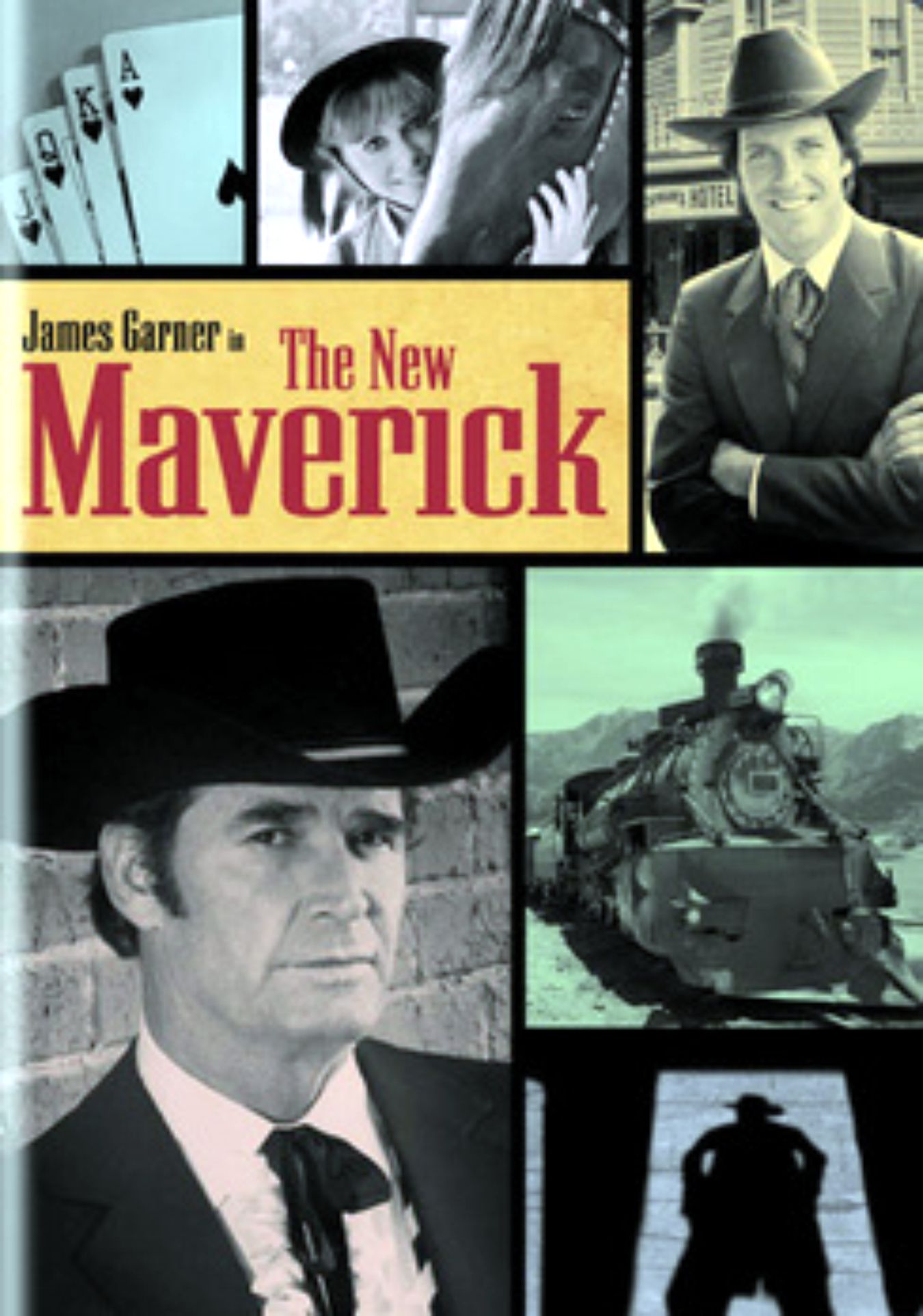 In 1978, an attempt to create an updated series began with the made-for-TV movie The New Maverick. Charles Frank starred as the son of Beau Maverick with Garner and Jack Kelly on hand to reprise their roles, now as the father figures to the younger gun. The resulting TV series (named Young Maverick) lasted only 7 episodes.
In 1978, an attempt to create an updated series began with the made-for-TV movie The New Maverick. Charles Frank starred as the son of Beau Maverick with Garner and Jack Kelly on hand to reprise their roles, now as the father figures to the younger gun. The resulting TV series (named Young Maverick) lasted only 7 episodes.
Up next for Garner was the very popular Rockford Files series, co-created by Roy Huggins, who said his goal was to do a series that basically placed the Maverick character into the modern world.
When Rockford ceased production, Garner finally returned as Brett Maverick in 1981 in a brand-new series called, what else - Brett Maverick. This time around, Brett was running a saloon in Arizona that he won in a poker game (natch). Jack Kelly made one appearance as Bart. The show achieved respectable ratings and the producers were gearing up for a second season, this time including Kelly as a full-time cast member, when NBC decided to cancel the show.
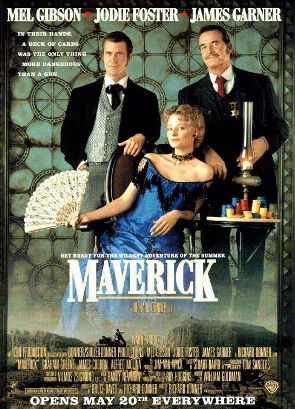 Garner’s final connection to the character came in the 1994 big budget film version of Maverick that starred Mel Gibson. Garner played Marshall Zane Cooper, who turned out to be >SPOILER ALERT< Maverick’s long-talked about, but never seen “Pappy.”
Garner’s final connection to the character came in the 1994 big budget film version of Maverick that starred Mel Gibson. Garner played Marshall Zane Cooper, who turned out to be >SPOILER ALERT< Maverick’s long-talked about, but never seen “Pappy.”
Maverick has remained remarkably popular in reruns (especially for a black & white show) and its entire run as well as the single season of Brett Maverick are available on home video.
Sing along with us, won’t you:
Who is the tall dark stranger there?
Maverick is the name
Ridin’ the trail to who knows where
Luck is his companion
Gamblin’ is his game
Smooth as handle on a gun
Maverick is the name
Wild as the wind in Oregon
Blowin’ up a canyon
Easier to tame.
Riverboat, ring your bell
Fare thee well, Annabelle
Luck is the lady that he loves the best
Natchez to New Orleans
Livin’ on Jacks and Queens
Maverick is a legend of the West
Maverick is a legend of the West!
(Music by David Buttolph / Lyrics by Paul Francis Webster)
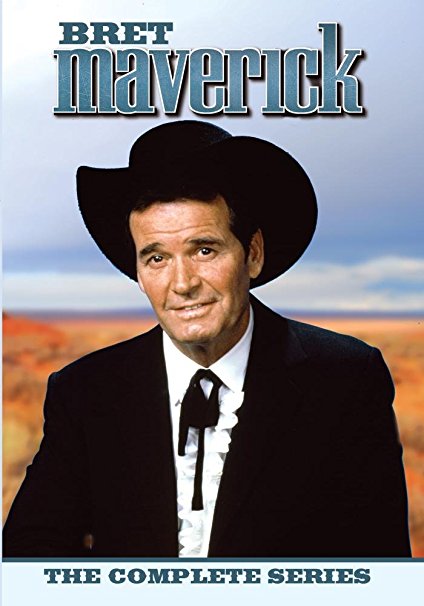
Giving the Baby Her Bottle - 1950's Style
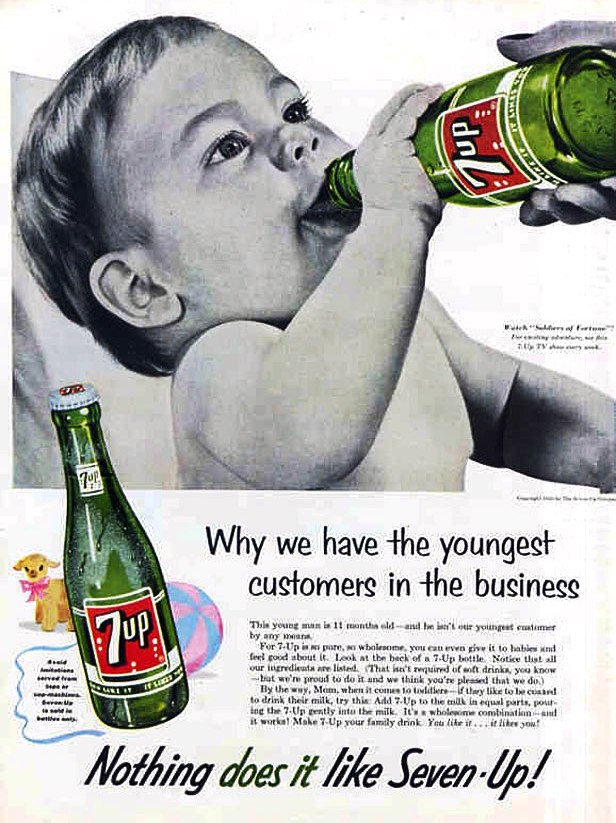
Managing Your Money Manager
 A few years back, the Department of Labor issued new rules to help protect consumers from money managers who were acting in their own best interest first and your interests second.
A few years back, the Department of Labor issued new rules to help protect consumers from money managers who were acting in their own best interest first and your interests second.
Now those rules may be repealed. Here are the steps you should take with anyone to whom you’ve entrusted your money:
- Ask that person to state in writing that they will always act as a fiduciary. The term “fiduciary” is a legal one. It means, under penalty of law, the fiduciary must always put your interests before any other in their financial dealings.
Just because someone calls themselves a “financial advisor” or “wealth manager,” it doesn’t mean they are legally a fiduciary. Often, the people will place your money into funds that pay them a higher commission or a bonus. It’s good for the advisor’s bank account, but may not be good for yours.
- Always ask your advisor to provide you with all of the costs and fees associated with any given investment. And again, make them do this in writing. What you want is a good-faith estimate of what you’ll wind up paying in direct fees or sales commissions.
- If you can find one, choosing an advisor who simply charges a flat fee may be preferable. Of course, always consult with your lawyer or other financial professional before taking any steps. And be advised that advisors who charge a flat fee or set percentage of the assets they will be managing can be more expensive than paying those direct fees and/or sales commissions. But the idea here is that a flat fee advisor has no financial interest in recommending one investment over another, besides helping you to get the best return so they will remain your advisor.
When Is the Best Time to Eat?
 We’ve all heard “Breakfast is the most important meal of the day!” But is it?
We’ve all heard “Breakfast is the most important meal of the day!” But is it?
A statement from the American Heart Association indicates it might be. Their researchers found that we metabolize foods differently at different times of the time. They found that people who eat within two hours of waking had lower heart disease risk factor compared to those who skip breakfast.
The Association cautions that these results are not conclusive because researchers did no further study to determine if people who ate a healthy breakfast also had other health habits that contributed to their lower risk factors.
Nonetheless, the report offered these general guidelines to lower your chances for heart disease and type-2 diabetes:
- Stick to a meal routine. Don’t eat whenever or change you schedule from day to day/
- Schedule your snacking. Just as with meals, planning and timing your snacks can help keep you from indulging in too much junk food.
- Eat less at night. It’s easier for your body to process sugar earlier in the day.
- Eliminate late night snacks altogether. Overnight, your metabolism is at its slowest. Throwing in more calories during this time is asking for trouble.
Operation Petticoat (1959)
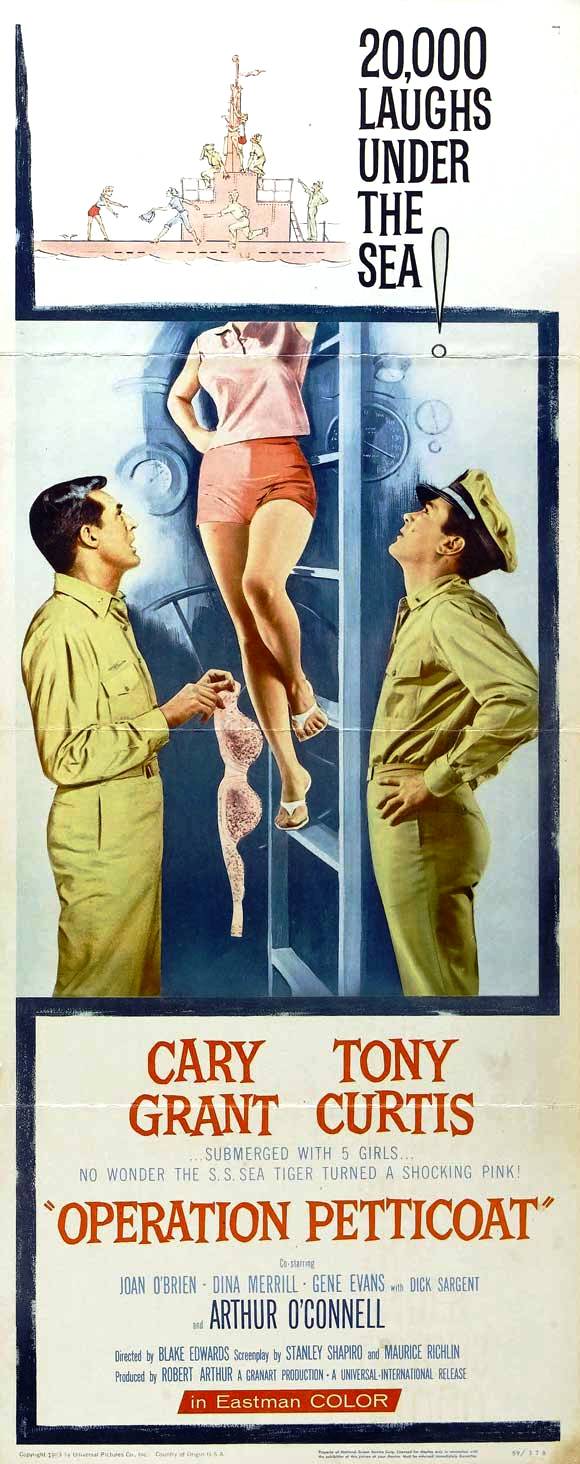 What could be funnier than men having to discuss bras and panties, right? Ah, the much more innocent 1950’s came to an end at movie theaters with this extremely popular WWII-themed sex comedy.
What could be funnier than men having to discuss bras and panties, right? Ah, the much more innocent 1950’s came to an end at movie theaters with this extremely popular WWII-themed sex comedy.
Operation Petticoat was made at Universal Pictures in 1959, apparently because Navy veteran Tony Curtis really wanted to co-star in a submarine movie with his idol, Cary Grant.
In one of those ironic little twists, Curtis’ other big picture for 1959 was Some Like It Hot, which also involved women’s underwear (this time, him wearing it) and Curtis performing a hilarious impression of Cary Grant as part of that film’s plot.
The film was directed by Blake Edwards, who would go on to much greater fame with the Pink Panther series and so many more movies. Paul King, Joseph Stone, Stanley Shapiro, and Maurice Richlin wrote the script, incorporating many actual incidents from World War II (including the accidental torpedoing of a bus and women military members needing to be evacuated by submarine). Looking at this lightweight bit of fluff today it’s hard to see how their screenplay was nominated for an Oscar, but it was.
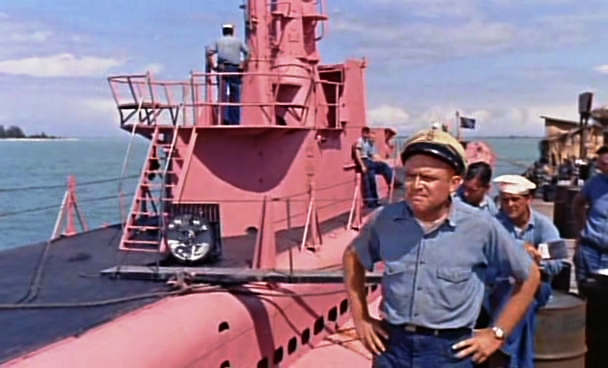 The plot seemed kind of rickety even back then. Cary Grant plays the commander of a broken-down submarine at the outset of WWII. The sub is nearly destroyed by Japanese planes before it ever got a chance to enter combat. Grant is determined to make the sub sea-worthy despite massive obstacles.
The plot seemed kind of rickety even back then. Cary Grant plays the commander of a broken-down submarine at the outset of WWII. The sub is nearly destroyed by Japanese planes before it ever got a chance to enter combat. Grant is determined to make the sub sea-worthy despite massive obstacles.
After he adds Tony Curtis, as the one essential element of every WWII service comedy, the wheeler dealer con man that can obtain whatever the plot needs him to get.
In short order, the sub limps out to sea, two of its four engines totally defunct and a third only working intermittently.
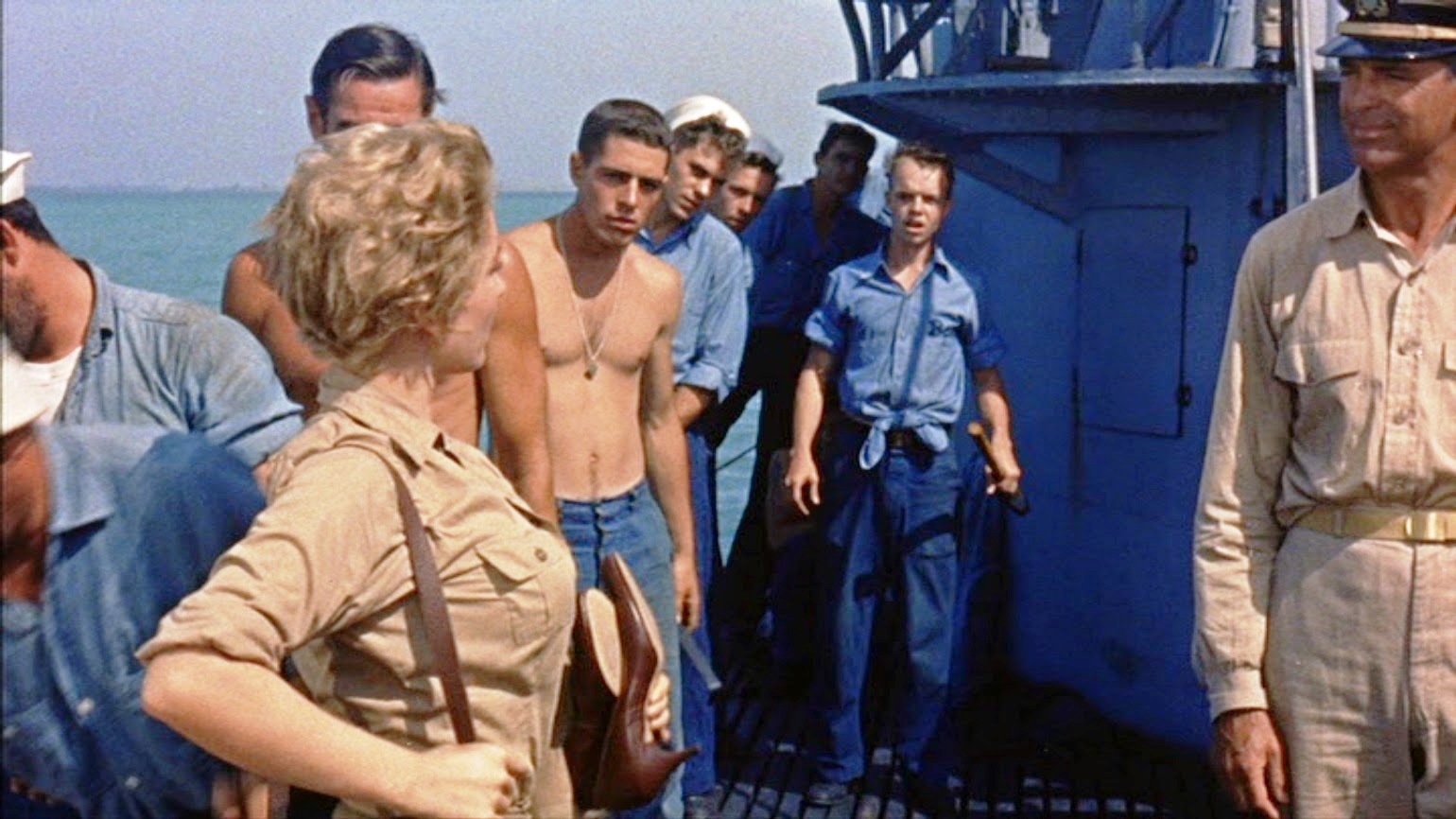 Grant soon has to take on board five stranded Army nurses, including Joan O’Brien, who has some massive obstacles of her own.
Grant soon has to take on board five stranded Army nurses, including Joan O’Brien, who has some massive obstacles of her own.
Hilariousity ensues with the sub eventually acquiring a coat of pink paint and the very survival of ship and crew depends on the nurses’ undergarments.
Along the way, we get all the unsubtle sexual humor of that time period. Men who cannot function when placed in close quarters with a female, bad women driver jokes, gerry-rigging Navy equipment with a girdle… it’s all here!
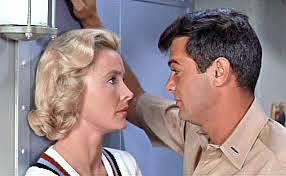 Some of the most fun for us today is seeing all the future TV stars who dot the supporting cast, including Gavin McLeod (Love Boat), Dick Sargent (Bewitched) and Marion Ross (Happy Days).
Some of the most fun for us today is seeing all the future TV stars who dot the supporting cast, including Gavin McLeod (Love Boat), Dick Sargent (Bewitched) and Marion Ross (Happy Days).
The film was a big hit when it was first released, winding up the third highest-grossing picture of that year.
Years later it spawned a TV version that featured Tony Curtis’ daughter playing the same nurse who was Curtis’ love interest in the original.
Operation Petticoat is widely available on home video.
Who knew war could be so much fun (at least until Hogan’s Heroes showed us how much fun a Nazi prison camp could be)?
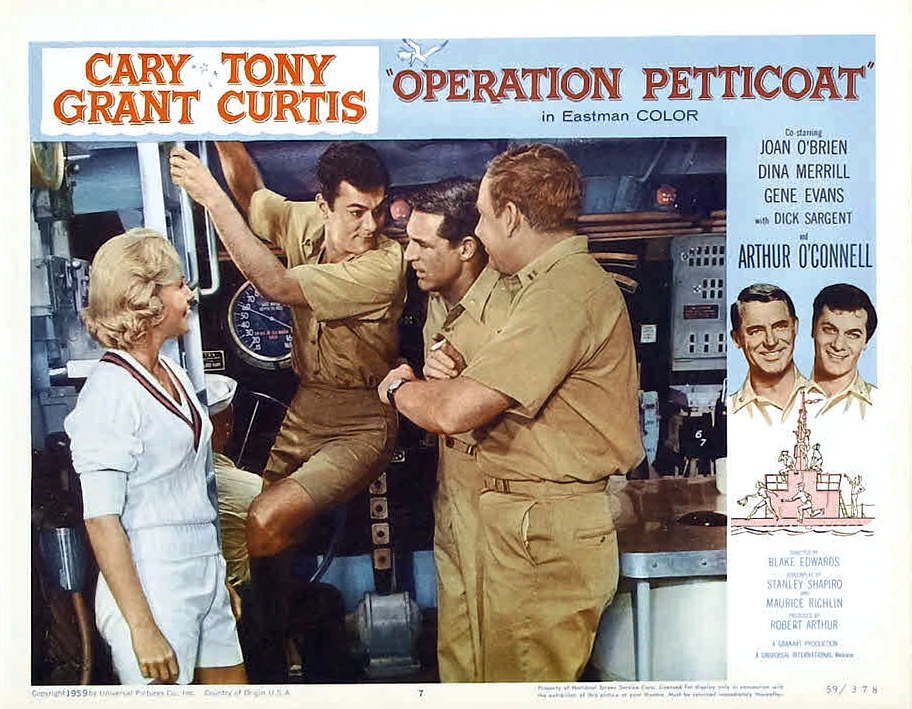
Supergroups of the 60's: Chad & Jeremy
Part of the initial British invasion, the folk-influenced pop duo of Chad Stuart and Jeremy Clyde went on to rack up 7 Top 40 hits in the U.S. before the shift to progressive rock made their brand of soft standards passé.
As popular as the boys were on this side of the pond, it’s surprising they had very little success in their native England, managing only one hit record (their very first, “Yesterday’s Gone”)!
David Stuart Chadwick and Michael Thomas Jeremy Clyde met while attending school in the UK. It was the future Chad Stuart who taught Clyde how to play the guitar. They performed as a folk duo, then formed a rock band called the Jerks, before finally settling into the musical identity they would hold for the rest of their careers.
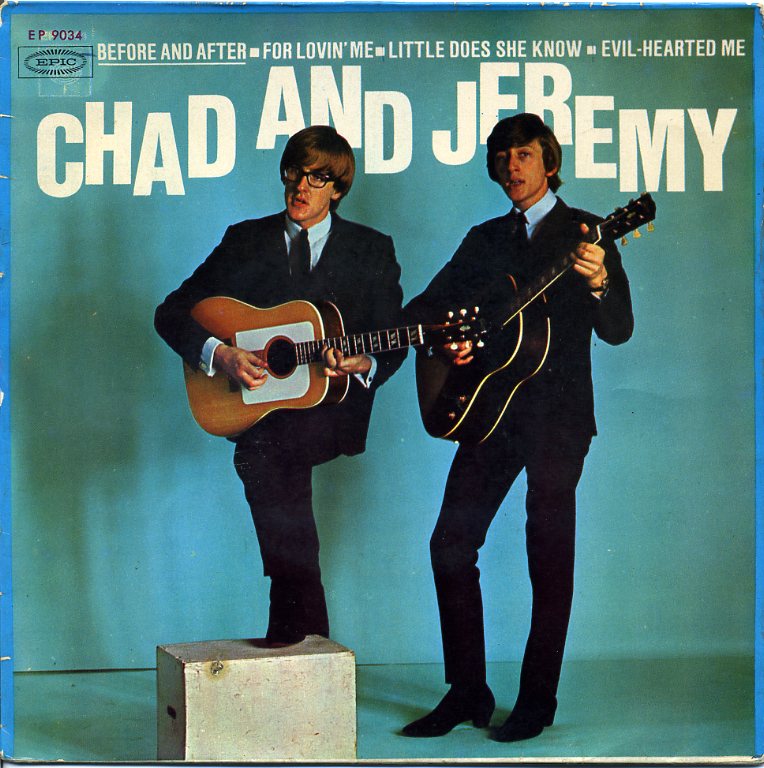 As Chad & Jeremy, they landed a contract with the British Ember Records and were assigned to legendary composer-producer John Barry (among his vast repertoire, Barry wrote the soundtrack for Goldfinger). He had them record a song Chad Stuart had written called “Yesterday’s Gone.”
As Chad & Jeremy, they landed a contract with the British Ember Records and were assigned to legendary composer-producer John Barry (among his vast repertoire, Barry wrote the soundtrack for Goldfinger). He had them record a song Chad Stuart had written called “Yesterday’s Gone.”
Their trademark “whisper” style of vocals came about because Barry kept telling the boys they were too loud. Take after take, they crept closer to the mikes and dropped the volume of their voices until Barry was satisfied.
The song raced up the UK charts, peaking at #6. They would never land another record in those charts.
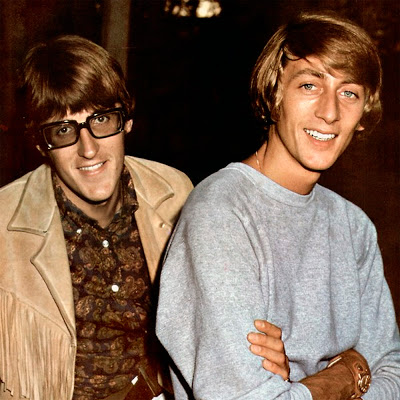 In America, they had far more success. “Yesterday’s Gone” was followed by another Stuart composition and the song for which they are best remembered, “Summer Song.” From 1964 to 1966, there was usually a Chad & Jeremy record on most Top 40 stations’ playlists.
In America, they had far more success. “Yesterday’s Gone” was followed by another Stuart composition and the song for which they are best remembered, “Summer Song.” From 1964 to 1966, there was usually a Chad & Jeremy record on most Top 40 stations’ playlists.
While Stuart was obviously a talented songwriter, he wasn’t terribly prolific. So the duo turned to old pop standards (“Willow Weep for Me”) and Broadway (“If I Loved You”) for material.
As their success seemed limited to North America (they were also popular in Canada), the pair spent most of their time in the States. Hassles with their green cards even led the boys to apply for U.S. citizenship, a process they did not complete.
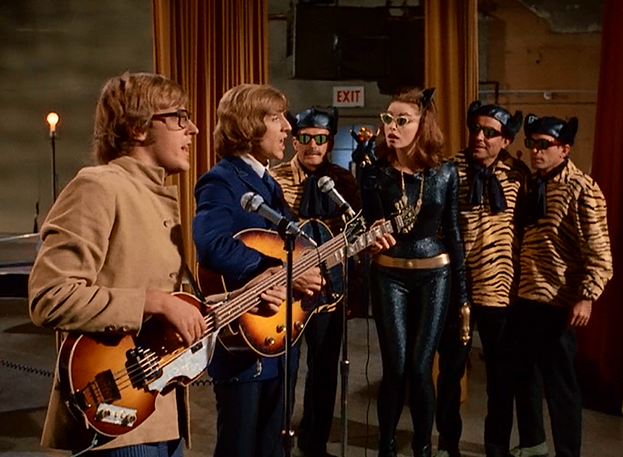 During the mid-60’s, they were also the go-to guys any time an American TV show wanted a generic “British pop group” in that week’s episode. Chad & Jeremy appeared under their own names or various aliases on The Dick Van Dyke Show, The Patty Duke Show, Batman, and even the Western, Laredo.
During the mid-60’s, they were also the go-to guys any time an American TV show wanted a generic “British pop group” in that week’s episode. Chad & Jeremy appeared under their own names or various aliases on The Dick Van Dyke Show, The Patty Duke Show, Batman, and even the Western, Laredo.
When “psychedelic rock” became the newest trend in 1967, Chad & Jeremy tried to keep pace with their own concept album, Of Cabbages and Kings. While favorably reviewed, the album’s sales were anemic. They followed that with The Ark (1968) and the soundtrack to Three in the Attic. Then, they threw in the towel and disbanded.
But not forever. They reunited in 1983 and have toured and recorded off and on again since then.
You can find out more about the group at their official website: chadandjeremy.net.
 If you get in a Chad & Jeremy mood from reading this little piece, here’s Boomtown America’s suggested “Greatest Hits” playlist for Chad & Jeremy:
If you get in a Chad & Jeremy mood from reading this little piece, here’s Boomtown America’s suggested “Greatest Hits” playlist for Chad & Jeremy:
- “Summer Song”
- “I Have Dreamed”
- “Before and After”
- “Distant Shores”
- “I Don’t Want to Lose You, Baby”
- “Four Strong Winds”
- “Willow Weep for Me”
- "The Girl from Ipanema"
- “Fare Thee Well”
- “If I Loved You”
- “Like I Love You Today”
- “Yesterday’s Gone”
- “My Coloring Book”
- “The Way You Look Tonight”
- “September in the Rain”
Happy Easter From Boomtown America!
Boomtown America, Buddy Sorrell, and Sally Rogers wish you a Happy Easter!

Unsafe Deposit Boxes?
 Think that collection of rare coins or the family jewels are safe in a safe deposit box? Maybe not.
Think that collection of rare coins or the family jewels are safe in a safe deposit box? Maybe not.
More than 50,000 of them have suffered losses due to burglary, fire, floods and tornadoes!
Fortunately, there are specialty insurers that will cover the contents of safe deposit boxes. Do a little research online and see if one might be right for you.
Pop Up Player
Latest Posts–Movies & TV
-
The TV That Time Forgot: Annie Oakley
There was a time when Westerns dominated television programming so thoroughly that it was tough (with no home video, no streaming, and just 3 networks if you lived in a city big enough to have…
-
The TV That Time Forgot: My Living Doll (1964-65)
For a show that lasted only a single season, a surprising number of Baby Boomers remember the situation comedy My Living Doll. Perhaps that’s because once seen, Julie Newmar cannot easily be forgotten. The situation…
-
Alfred Hitchcock Presents
While often lumped together with “The Twilight Zone” and “Boris Karloff’s Thriller,” “Alfred Hitchcock Presents” is the true original, debuting 4 years before TZ and 5 before “Thriller.” Alfred Hitchcock’s show was also different than…
-
The TV That Time Forgot: The Donna Reed Show
For 8 seasons, The Donna Reed Show provided Baby Boomers with a sort of Mother Knows Best amid a ton of family sitcoms focused on the father. Cast as Donna Stone, Donna presided over a…
-
Friday Night at the Drive-In: Lover Come Back (1961)
Sequels & remakes? Nothing new here – Hollywood’s been recycling stuff ever since the first “magic lantern shows.” Want proof? Let’s settle in to watch one of those terribly puritanical “sex comedies” from the Sixties…
-
The TV That Time Forgot: The Millionaire
Boy! Could we use a show like this in real life! From 1955 to 1960, for 5 seasons an eccentric millionaire would give away $1 million to somebody he never even met. We were allowed…




